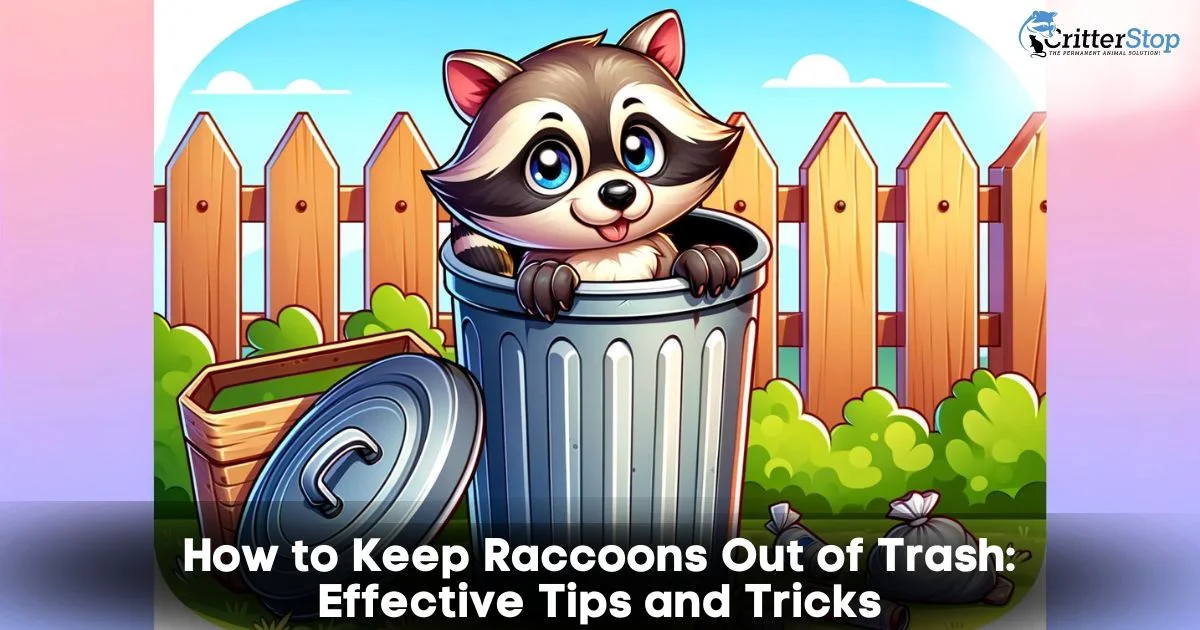
Raccoons have a reputation for their scavenging tendencies, often targeting household garbage as one of their preferred sources of food. These clever critters can easily tear through trash bags and containers, leaving a mess behind. Not only is this visually unappealing, but it can also lure in other undesirable pests such as rodents and insects. To avoid this problem, homeowners must take steps to keep raccoons out of their trash.
There are several methods to prevent raccoons from accessing your trash, including securing lids, using animal-proof containers, and removing food sources. By securing lids tightly, raccoons will have a harder time accessing the contents of your trash. Additionally, using animal-proof containers can make it nearly impossible for raccoons to get into your trash. Finally, removing any food sources, such as pet food or birdseed, can discourage raccoons from visiting your property altogether. With these methods in mind, homeowners can keep raccoons out of their trash and maintain a clean and pest-free home.
Raccoons have a penchant for trash due to its easy availability as a food source. Being omnivores, they consume both plant and animal matter, indulging in a diverse diet comprising fruits, nuts, insects, small creatures, and occasionally, human food.
Trash cans are especially attractive to raccoons because they contain a variety of food sources. They are also easy to access. Raccoons are intelligent animals that can figure out how to open trash can lids and get inside. Once they discover a reliable food source, they'll continue to return to it.
Raccoons are creatures of the night, being nocturnal, which means they're most active after dark. They're also incredibly adaptable, capable of thriving in a wide range of habitats, including forests, suburban areas, and even cities. They excel at climbing and can effortlessly scale trees, walls, and fences.
Raccoons are also known for their dexterity. They have very nimble fingers that allow them to manipulate objects with ease. This is why they are so good at getting into trash cans. They can use their fingers to open lids, pull out bags, and even untie knots.
In addition to their love of trash, raccoons are also known for their intelligence and curiosity. They are very curious animals that like to explore their surroundings. They're highly social animals, often living in groups called "nurseries" that are made up of females and their young.
Overall, understanding raccoon behavior is key to keeping them out of your trash. By knowing why they are attracted to trash and their common habits and traits, you can implement measures to deter them from accessing your garbage cans.
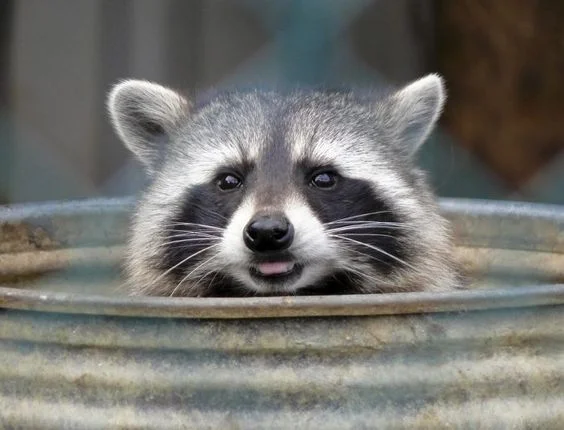
Raccoons are notorious for their ability to get into trash cans and make a mess. Nevertheless, there are various preventative steps that can be taken to deter raccoons from rummaging through trash.
One of the most effective ways to keep raccoons out of trash is to secure the trash cans. This can be achieved by securing the lids tightly closed using bungee cords or other types of straps. It is also important to make sure that the trash cans are not easily tipped over. Placing heavy objects on the lids or securing the cans to a fence or post can help prevent raccoons in trash.
Using Raccoon Repellents
Another preventive measure is to use raccoon repellents. There are several types of repellents available, including natural and chemical options. One natural option is to sprinkle cayenne pepper around the trash cans, as raccoons do not like the smell. There are also chemical repellents that can be sprayed around the trash cans to keep raccoons away.
It is important to note that while these while preventive measures can be effective, they may not entirely eradicate the risk of raccoon intrusion. If raccoons persist as a problem, it might be necessary to seek assistance from a professional wildlife removal service.
By implementing these preventive measures, homeowners can decrease the chances of raccoon intrusion and maintain the security of their trash cans.
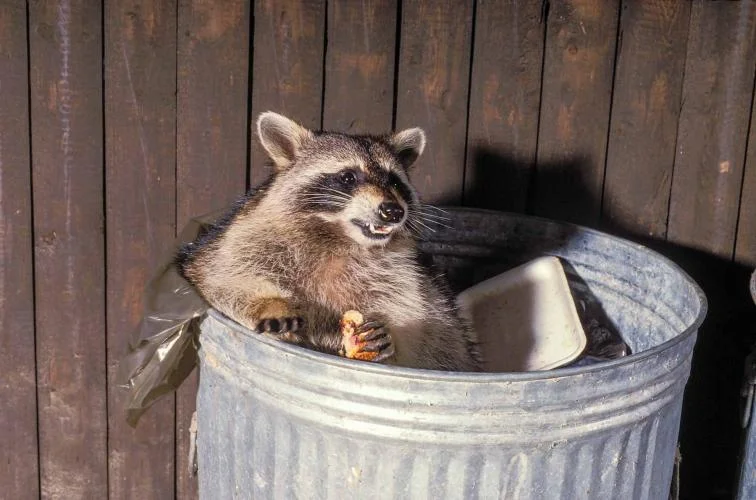
Raccoons are known for their ability to get into almost anything, including trash cans. However, there are various physical barriers and deterrents that can be employed to prevent raccoons from accessing trash.
One effective way to keep raccoons out of trash is to install a fence or enclosure around the area where the trash cans are kept. This can be a simple wire fence or a more elaborate wooden enclosure. The fence or enclosure should be at least 3 feet high, with no gaps or holes that raccoons can crawl through. It's also crucial to ensure that the fence or enclosure is securely anchored to the ground so that raccoons can't knock it over.
Another way to deter raccoons from accessing trash is to create unfavorable conditions around the area. This can be done by using strong-smelling deterrents such as ammonia, vinegar, or cayenne pepper. These strong odors can help to mask the scent of the trash and make the area less attractive to raccoons.
In addition, it's important to make sure that the trash cans are tightly sealed and secured. Raccoons are very persistent and will often try to pry open lids or knock over trash cans to get to the contents inside. Using bungee cords or other secure fasteners can help to prevent this.
Overall, using physical barriers and deterrents is an effective way to keep raccoons out of trash. By following these simple steps, homeowners can safeguard their property and deter raccoons effectively.
One of the most effective ways to keep raccoons out of trash is by using proper disposal techniques. Ensure that food waste is disposed of in sealed containers and avoid leaving bags of trash outside overnight. Raccoons are nocturnal animals, and they are attracted to the smell of food. By keeping food waste sealed and disposing of it properly, you can reduce the likelihood of raccoons in trash.
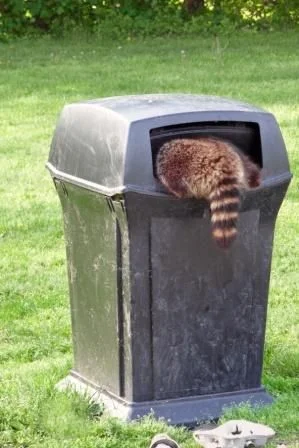
Regular trash maintenance is another important strategy for keeping raccoons out of trash. Be sure to regularly empty the trash and maintain cleanliness in the vicinity of the trash cans. This will help to reduce the amount of food waste and other attractive smells that may attract raccoons.
In addition, consider using trash cans with tight-fitting lids and placing them in a secure location, such as a garage or shed. This will help to prevent raccoons from accessing the trash cans and making a mess.
By implementing these trash management strategies, you can effectively keep raccoons out of your trash and avoid the mess and nuisance that comes with raccoon infestations.
One effective biological control method for keeping raccoons out of trash is to encourage the presence of natural predators. Coyotes, foxes, and owls are known to prey on raccoons and can help regulate their population. Homeowners can create habitats for these animals by planting native vegetation, providing nesting boxes, and avoiding the use of pesticides. However, it's important to note that encouraging predator populations can also have unintended consequences, such as increased predation on pets or other wildlife.
Another option for biological control is to use repellents that are derived from natural sources. These can include predator urine, such as that of coyotes or foxes, or plant-based repellents like peppermint oil or garlic. These can be applied or sprayed around the perimeter of the trash cans or directly on the trash bags to deter raccoons. However, it's important to note that these repellents may not always be effective in all situations and may need to be reapplied frequently. Additionally, some repellents may have negative impacts on other wildlife or the environment, so it's crucial to use them carefully and in accordance with the manufacturer's instructions.
When dealing with raccoons, it is important to be aware of wildlife protection laws in your area. These laws are enacted to safeguard animals from harm and ensure their survival. In many regions, raccoons are protected under wildlife protection laws, which means that harming or killing them can result in fines or even criminal charges.
It is important to research and understand the wildlife protection laws in your area before taking any action to remove raccoons from your property. Some regions may require permits or licenses to trap or relocate raccoons, while others may prohibit certain methods of removal altogether.
When attempting to keep raccoons out of your trash, it is important to consider their well-being and treat them humanely. Raccoons are intelligent and social animals that are capable of experiencing pain and suffering.
Using inhumane methods to remove raccoons, such as poison or drowning, is not only illegal in many regions, but also unethical. Instead, it is recommended to use humane methods such as live trapping and relocation to safely remove raccoons from your property.
It is also important to provide alternative food sources for raccoons, such as bird feeders or compost bins, to discourage them from rummaging through your trash. By taking these measures, you can effectively keep raccoons out of your trash while also respecting their well-being.
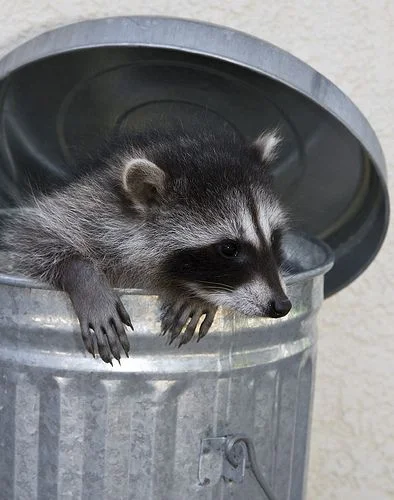
One of the most effective ways to keep raccoons out of trash is through proper management of neighborhood trash. Communities can work together to establish guidelines for trash disposal, such as using secure trash cans with tight-fitting lids and placing them in designated areas.
Neighborhood watch programs can also help deter raccoons by keeping an eye out for suspicious activity and reporting any sightings. It's crucial for residents to remain vigilant and report any issues with trash management to the appropriate authorities.
Collaborative deterrence strategies can also be effective in keeping raccoons out of trash. For example, neighbors can work together to install motion-activated lights or sprinklers around trash cans to startle and deter raccoons.
Another strategy is to use natural deterrents, such as planting certain plants or herbs around trash cans that raccoons find unappealing. This can include plants with strong odors like lavender or herbs like rosemary.
By working together and implementing these strategies, communities can reduce the likelihood of raccoons getting into trash and causing problems for residents.
If the raccoon problem is severe, or if the homeowner is uncomfortable handling the situation themselves, it may be time to call in professional wildlife control. A wildlife control expert will be able to evaluate the situation and recommend the most suitable course of action.
Another option for homeowners is to hire a pest management service. Pest management services can provide a variety of options to keep raccoons out of the trash, such as installing motion-activated sprinklers or using repellents. Homeowners should research and compare different pest management services to find one that fits their needs and budget.
If you're struggling to keep raccoons out of your trash and need professional assistance, consider hiring our raccoon removal services. Our Critter Stop team of experienced professionals uses humane and effective methods to remove raccoons and prevent them from returning. Contact us at (214) 234-2616 today to schedule an appointment.
Raccoons are attracted to garbage because of the food scraps and leftovers that it contains. To keep raccoons out of your trash, make sure to dispose of food waste properly. This means putting it in a sealed container and keeping it away from your trash cans. You can also opt for a trash can with a securely fitting lid to deter raccoons from accessing it.
There are several ways to stop raccoons from getting in your trash. One method is to utilize a bungee cord or strap to fasten the lid of your trash can securely. This will hinder raccoons from lifting the lid and gaining access.. Another option is to use a trash can with a locking lid. This will ensure that the lid stays securely in place and raccoons cannot get in.
To keep raccoons out of your trash cans, ensure you utilize a trash can with a snug-fitting lid to prevent raccoons from lifting it and gaining access. Additionally, employing a bungee cord or strap to secure the lid provides an added layer of defense against raccoon intrusion.
To keep raccoons away from your trash, make sure to dispose of food waste properly. This means putting it in a sealed container and keeping it away from your trash cans. You can also use a trash can with a tight-fitting lid to prevent raccoons from getting in. Additionally, you can try using a motion-activated sprinkler or ultrasonic device to deter raccoons from coming near your trash.
To prevent raccoons from accessing your garbage cans, ensure you use a trash can with a secure, tight-fitting lid. Additionally, consider using a bungee cord or strap to further secure the lid of your trash can. Another option is to use a trash can with a locking lid. This will ensure that the lid stays securely in place and raccoons cannot get in. Finally, make sure to dispose of food waste properly and keep it away from your trash cans.
Yes, raccoons are notorious for rummaging through trash cans. They are intelligent and curious creatures with a keen sense of smell, which leads them to seek out food scraps and leftovers in garbage bins. Raccoons can be quite adept at opening lids and accessing the contents of trash cans, sometimes causing quite a mess in the process.
Yes, raccoons are often capable of opening trash cans, especially if the lids are not securely fastened. Their dexterous front paws allow them to manipulate lids and access the contents inside. They can be remarkably resourceful when it comes to locating food, so it's important to use secure lids or other deterrents to prevent raccoons from getting into trash cans.
Raccoons are attracted to trash because it often contains food scraps and leftovers that provide an easy and readily available food source. In urban and suburban environments, where human settlements overlap with raccoon habitats, trash cans become convenient targets for these opportunistic animals. Additionally, raccoons are omnivores with a varied diet, so they are naturally drawn to the assortment of food items typically found in garbage bins.
Visit our Critter Library and learn more about our furry friends